Working Papers
For submission of articles or Working Papers to CEsA, please send an email to:
comunicacao@cesa.iseg.ulisboa.pt
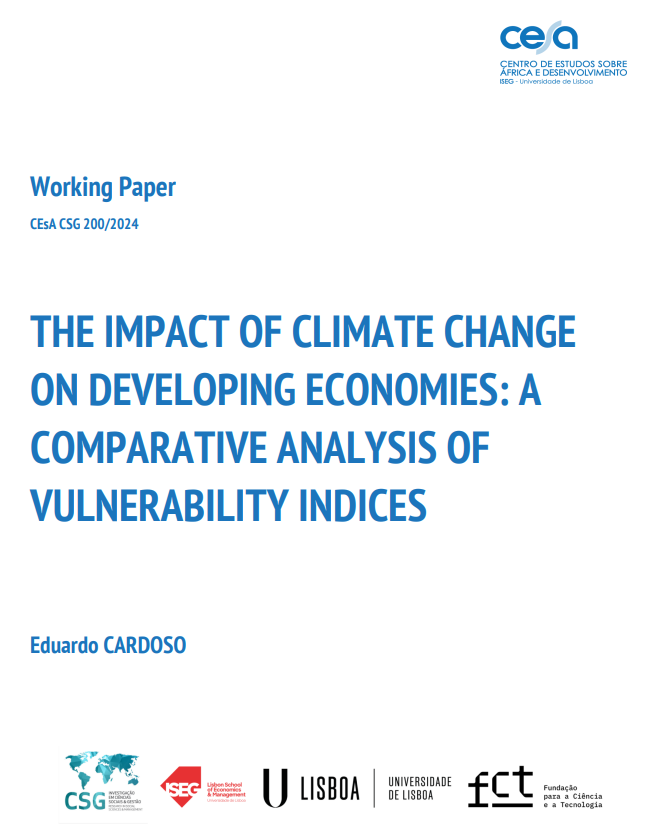
Working Paper 200/2024: The Impact of Climate Change on Developing Economies: A comparative analysis of vulnerability indices
Abstract:
In order to make informed decisions on climate finance and policies, there is an increasing need to develop an index to assess countries’ vulnerability to climate change. However, differing concepts and methodologies have led to varied views on which countries are most vulnerable and deserve more international financial support. This Working Paper examines whether key indices in climate science consistently classify countries’ vulnerability to climate disruption. It begins by reviewing literature on the impact of climate change on developing countries, followed by a comparative analysis of the EVI, ND-GAIN, INFORM, and WRI indices from 2014 to 2020. The findings indicate that while these indices are valuable for understanding and monitoring vulnerability, their differing components lead to divergent results. This research underscores the importance of a holistic approach to vulnerability assessment and calls for informed selection of indices based on specific objectives and contexts.
Cite this Working Paper:
Cardoso, Eduardo (2024). “The Impact of Climate Change on Developing Economies: A comparative analysis of vulnerability indices”. CEsA/CSG – Documentos de Trabalho nº 200/2024.
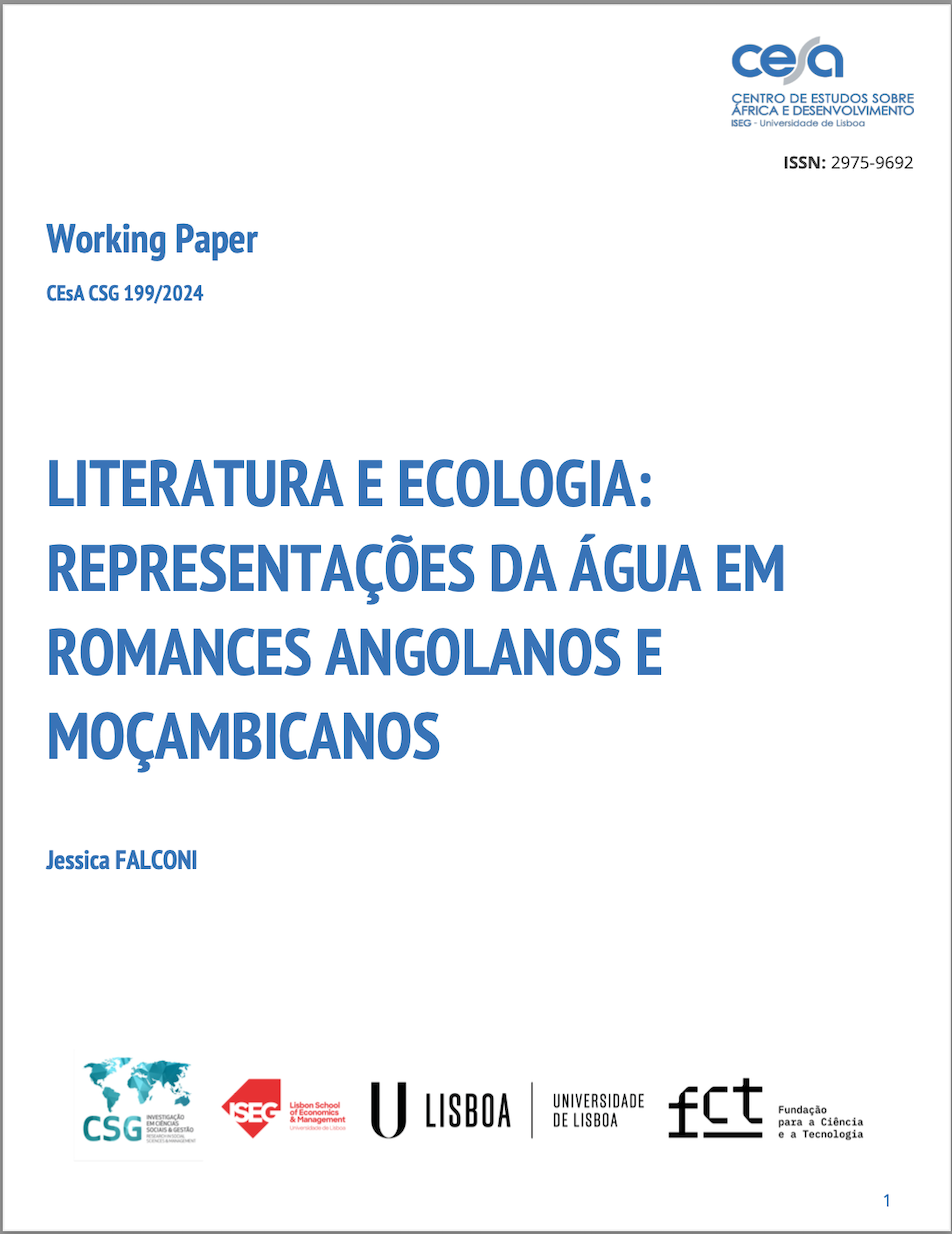
Working Paper 199/2024: Literatura e Ecologia: Representações da água em romances angolanos e moçambicanos
Abstract:
This article offers a brief cartography of the narrative role of water in Angolan and Mozambican literature, through a comparative reading of four novels: O desejo de Kianda (1995) by the Angolan Pepetela; De Rios Velhos e Guerrilheiros. I. O Livro dos Rios (2006) by Luandino Vieira; Água. Uma novela rural (2016) and Ponta Gea (2017) both by the Mozambican João Paulo Borges Coelho.
The introduction places the proposed cartography within the framework of ecocritical studies, whose various paradigms offer useful tools and concepts for reading the selected literary works. The thematic and comparative methodological approach highlights experiences and imaginaries common to two post-colonial contexts, despite the difference in scenarios, themes, aesthetic choices and narrative strategies. The analysis aims to demonstrate that water is a crucial element in narrating post-colonial Angolan and Mozambican societies.
Cite this Working Paper:
Falconi, Jessica (2024). “Literatura e Ecologia: Representações da água em romances angolanos e moçambicanos”. CEsA/CGS – Documentos de trabalho nº 199/2024
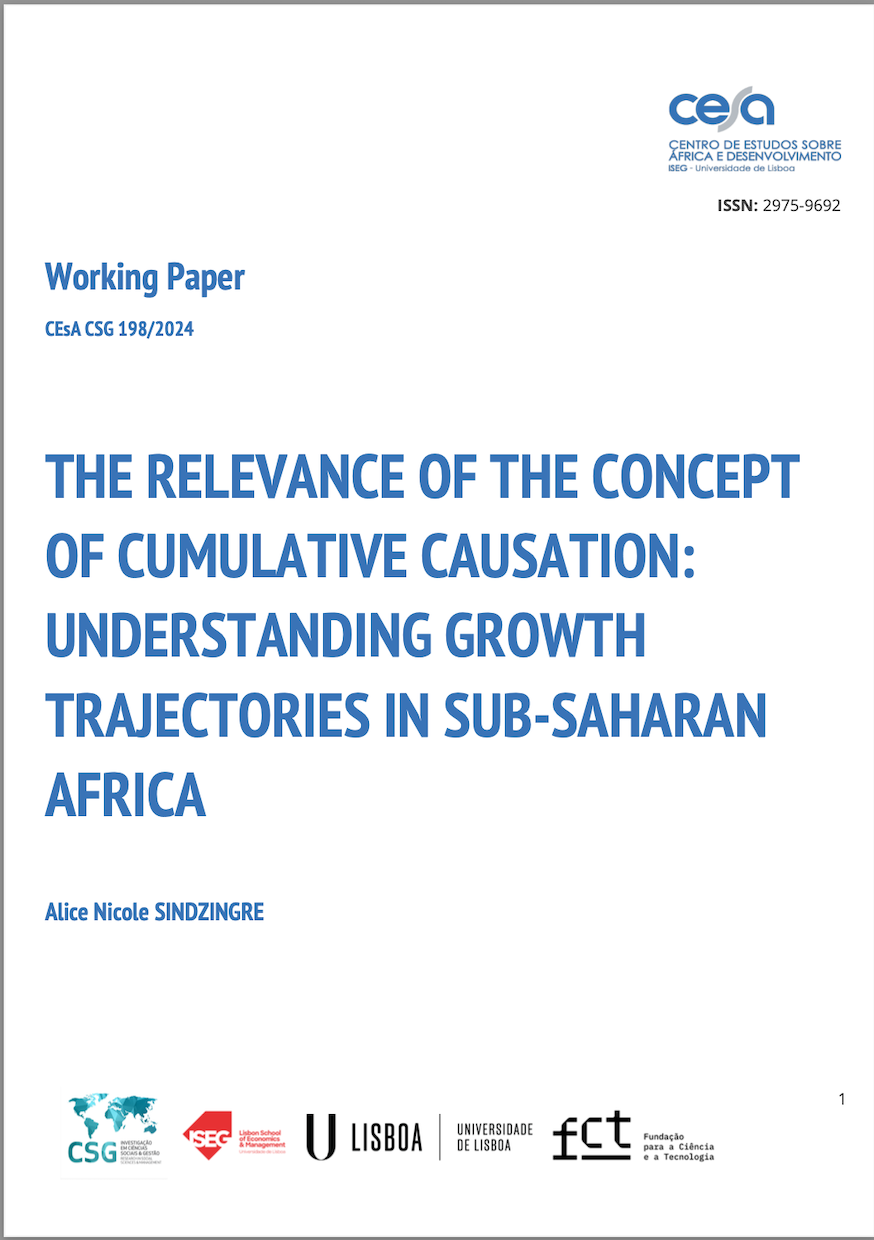
Working Paper 198/2024: The Relevance of the Concept of Cumulative Causation: Understanding growth trajectories in Sub-Saharan Africa
Abstract:
Differences in growth trajectories among countries – including the possibility of divergence -, are a central issue in economics. Mainstream economics explain growth processes via varieties of neoclassical models, even improved with concepts such as institutions. Yet such models have difficulties in providing accurate accounts of the growth trajectories of many developing countries, notably low-income ones. It is argued that the growth paths of low-income countries are more appropriately explained by the theoretical framework that relies on the nexus of concepts of cumulative causation, non-linearities, threshold effects, self-reinforcing processes, irreversibility, path dependence and traps – though this approach remains marginal in mainstream economic analyses of growth and development. Firstly, this nexus of concepts is a powerful framework concerning the possibility and explanation of dynamic divergence regarding growth between countries, as it exhibits properties such as: the possibility of cumulative, dynamically self-reinforcing, processes; the existence of thresholds and tipping points; multiple equilibria. Secondly, cumulative causation, by definition, involves a combination of causes: its conceptual framework allows for the integration of several dimensions – economic, political, social, cognitive -, whose combination results in either virtuous or vicious circles. In developing countries, these causes (and their coalescence) typically consist in economic structures (e.g., commodity-based export markets), political institutions and social norms (predatory regimes, high inequality) as well as types of public policies.
Cite this Working Paper:
Sindzingre, Alice Nicole (2024). “The Relevance of the Concept of Cumulative Causation: Understanding growth trajectories in Sub-Saharan Africa”. CEsA/CGS – Documentos de trabalho nº 198/2024
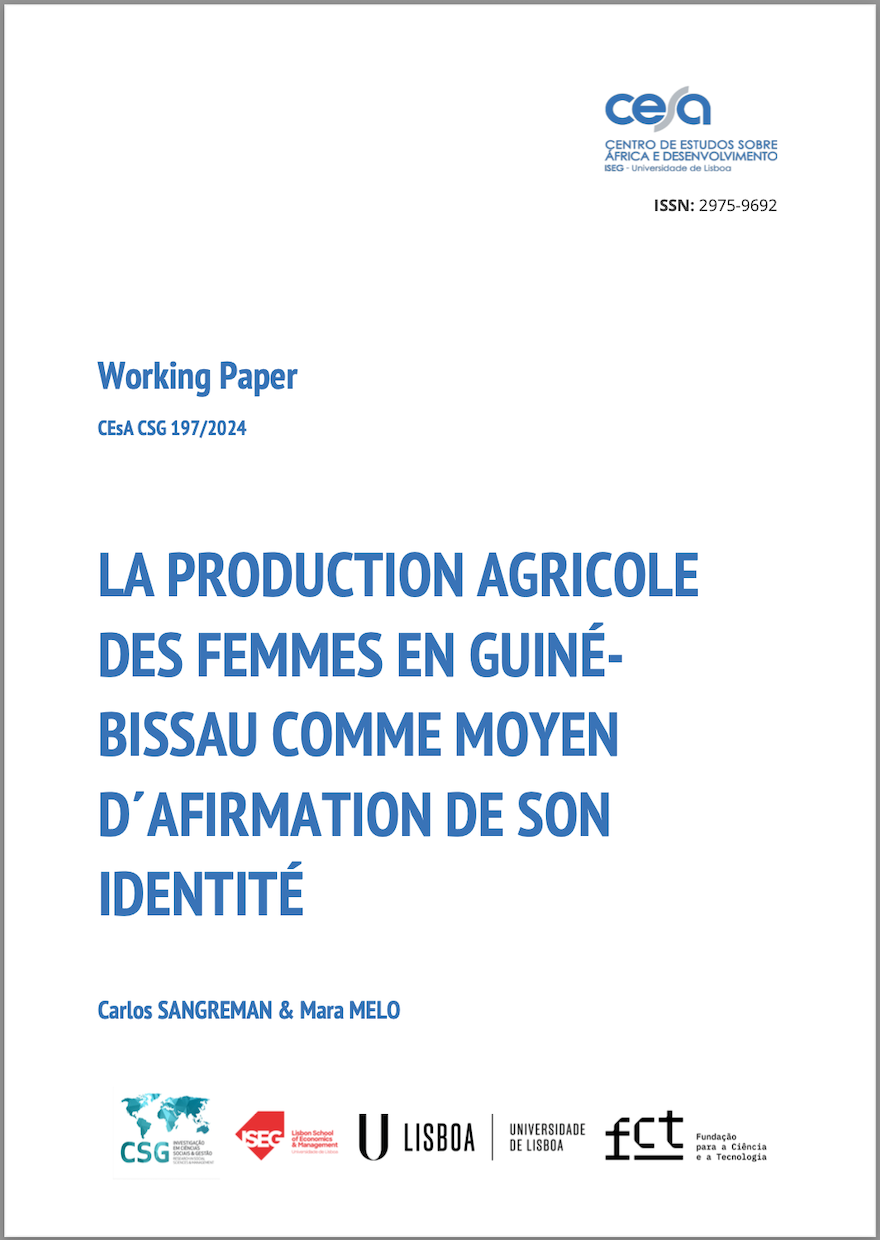
Working Paper 197/2024: La Production Agricole des Femmes en Guiné-Bissau comme Moyen d´Afirmation de son Identité
Abstract:
This working paper is an intermediate product of the study done for Swiss Cooperation in Guinea-Bissau, written in French without any point in Portuguese. What we demonstrate, as well as the principles of restitution and appropriation by the persons or institutions that access to respond to surveys or interviews, are words that do not translate into concrete actions for this Cooperation. The data were obtained by surveys and interviews in the regions of Bissau, Biombo, Bafatá, and Oio, with the producers (which also include a limited number of male producers) of leguminous agricultural products, in a sample of 160 people chosen at random. At the option of the promoter, the study focused on the marketing of products and not on production. To better understand the results, it must be said that this business model is not very profitable, but it is an activity that gives a greater independence of women in relation to men in the family space, since decisions about the use of profits belong to the producers. It also has a potential environment of action for the affirmation of the social (and not just family) identity of women that should not be despised although, as far as we can see, this is expressed for now only in the organization of associations of producers.
Cite this Working Paper:
Sangreman, C. e Melo, M. (2024). “La Production Agricole Des Femmes En Guiné-Bissau Comme Moyen D´Afirmation De Son Identité”. Instituto Superior de Economia e Gestão – CEsA/CGS – Documentos de trabalho nº 197/2024
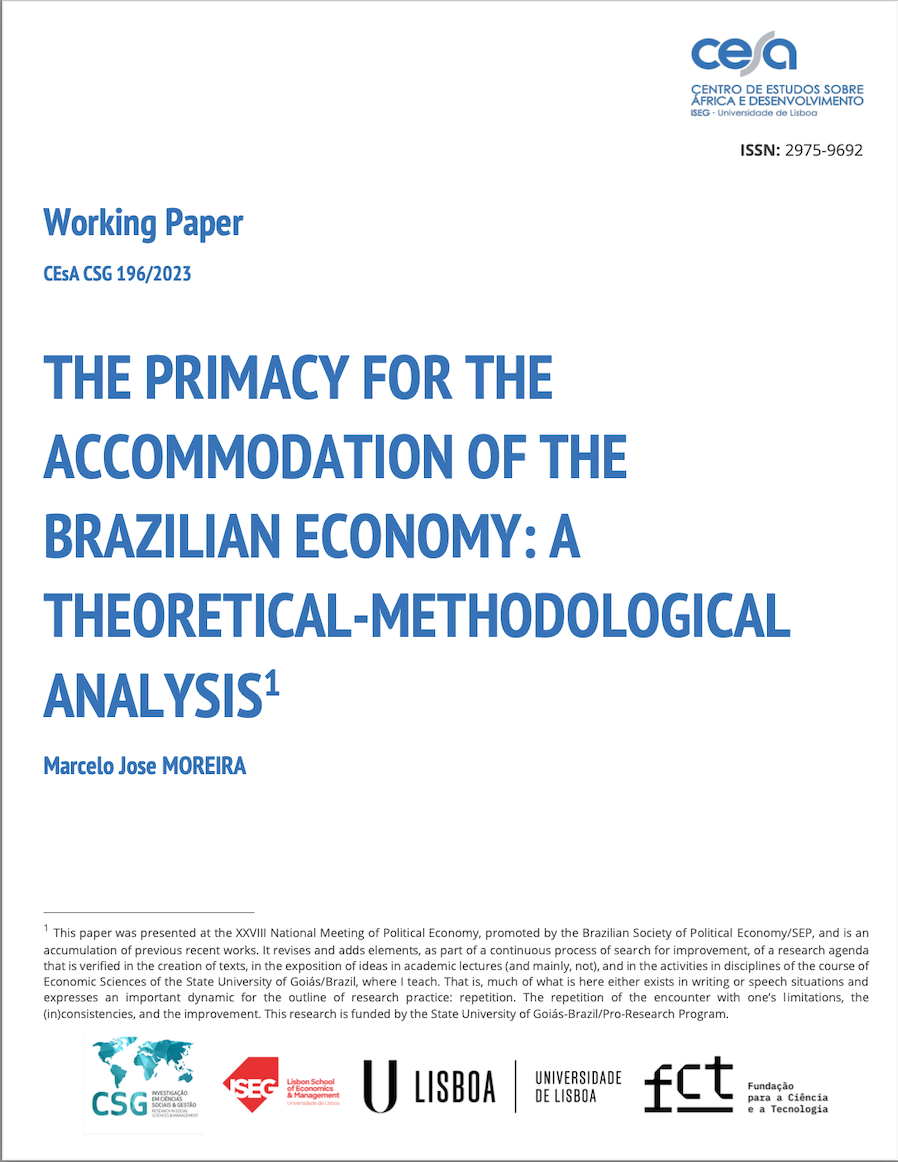
Working Paper 196/2023: The Primacy for the Accommodation of the Brazilian Economy: A Theoretical-Methodological Analysis
Abstract:
The capitalist economy is immersed in generalized inertia. A movement of slow accumulation, low investment, limited growth rates, but with a high level of profit, and which is due to intense pressure on the levels of existing inequalities, combining worldwide restructuring of the generation of wealth and income to a pattern of reproduction of the labor force at the level of its limited maintenance. This inertia occurs, above all, from the financial-productive crisis of the first decade of the 2000s. Brazil is no stranger to this inertia and its developments. Therefore, this paper intends, from a conceptual reflection, to analyze the national economic conjuncture, from what I call the structure and primacy for the accommodation of the Brazilian economy.
Cite this Working Paper:
Moreira, Marcelo Jose (2023). “The Primacy for the Accommodation of the Brazilian Economy: A Theoretical-Methodological Analysis”. CEsA/CGS – Documentos de trabalho nº 196/2023
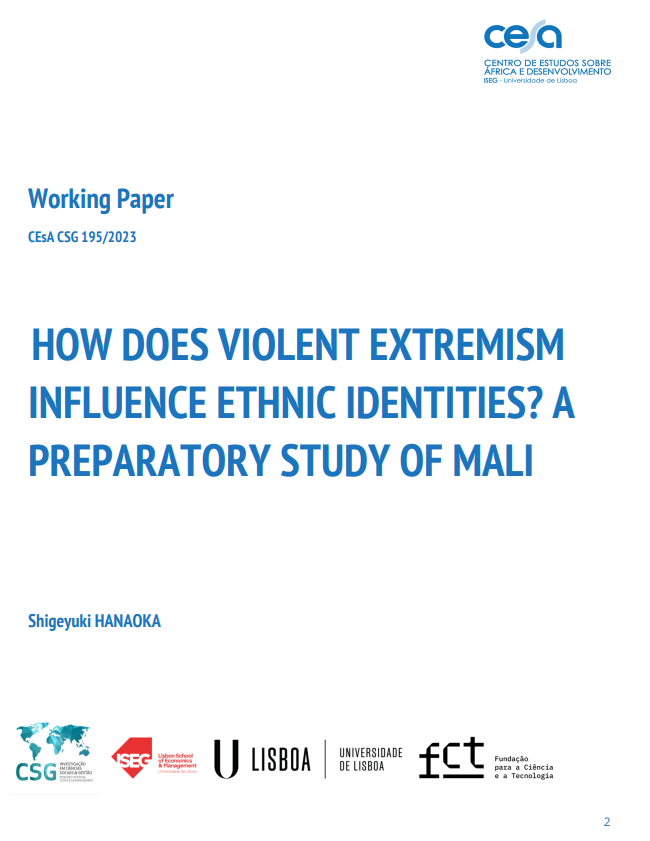
Working Paper 195/2023: How Does Violent Extremism Influence Ethnic Identities? A Preparatory Study Of Mali
Abstract:
How does violent extremism (VE) impact individuals’ ethnic identities? While there is a broad body of research on VE, which has seen significant growth in Africa in recent years, including assessments of its origins, the coalescence of various movements, and military operations against VE, research on its impact on ethnic identity and its associated political behaviours remains limited. This work serves as a preparatory study to examine how people’s perceptions, and political behaviours related to ethnic identity have evolved during the period of VE’s substantial expansion in Mali in recent years.
Quotation:
Hanaoka, Shigeyuki (2023). “How Does Violent Extremism Influence Ethnic Identities? A Preparatory Study Of Mali”. CEsA/CGS – Documentos de trabalho nº 195/2023
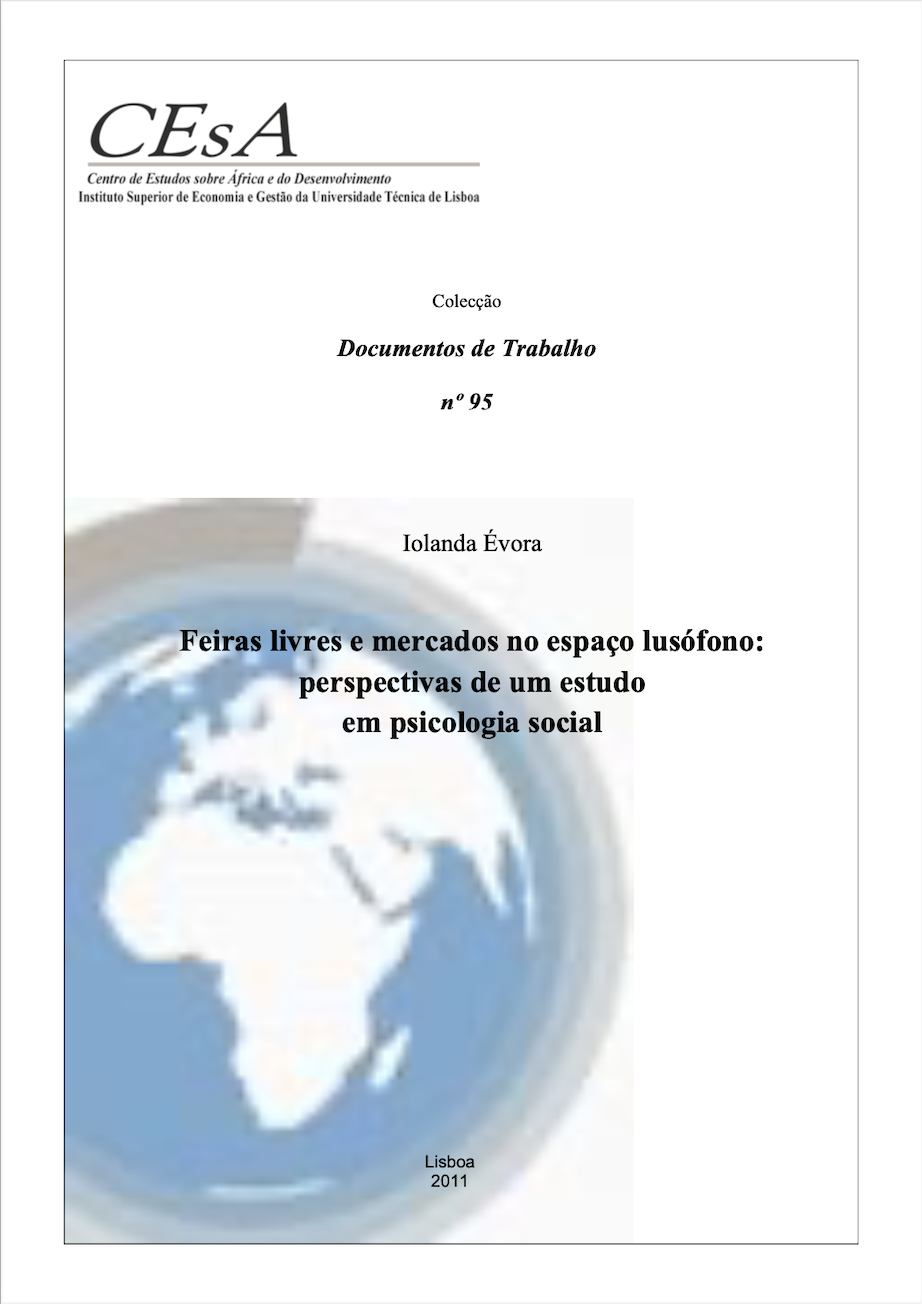
Working Paper 95/2011: Feiras Livres e Mercados no Espaço Lusófono: Perspectivas de um estudo em psicologia social
Abstract:
This communication proposes a reflection on the research methods to be applied in the study “Feiras Livres e Mercados no Espaço Lusófono: Perspectivas de um estudo em psicologia social”. The interest in the field is due, in the first place, to the type of study to be carried out and to the singularities of the proposed project, such as the fact that it will be carried out in the cities of Bissau, Praia and São Paulo, involving researchers from different areas of science and propose a field work with the subjects. Fairs and markets constitute the empirical objective of this study, presenting themselves as important universes of human activity and survival that mark the urbanity of capitals in the Portuguese-speaking space. The aim is to study the components and conditions for building a work base that will enable workers in markets and fairs to generate income through work in micro-enterprises. The study must identify and describe the material and psychosocial conditions that made it possible to become a worker in these free markets, building and acquiring the knowledge to be included in this work activity.
Quotation:
Évora, Iolanda. 2011. “Feiras Livres e Mercados no Espaço Lusófono: Perspectivas de um estudo em psicologia social”. Instituto Superior de Economia e Gestão – CEsA Documentos de Trabalho nº 95-2011.
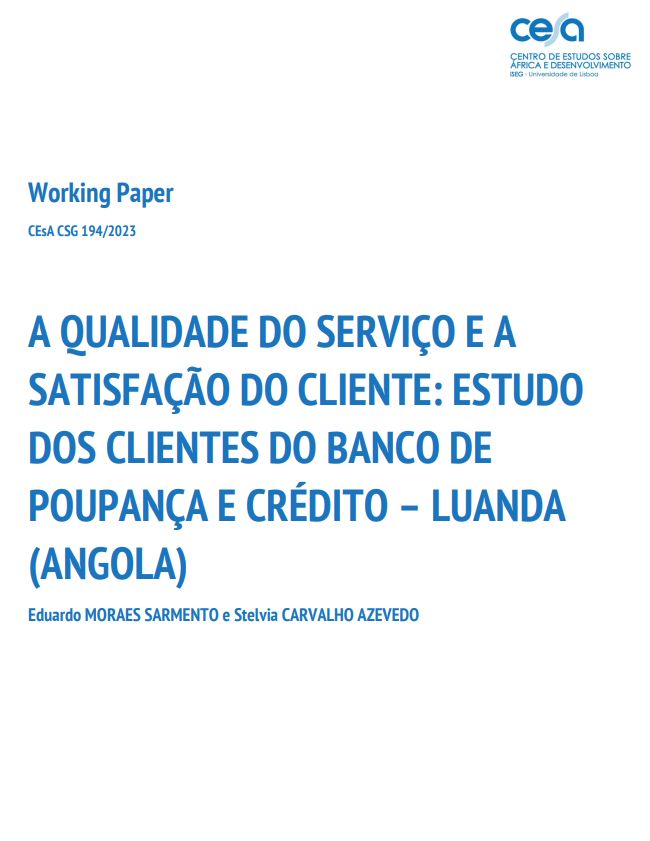
Working Paper 194/2023: A Qualidade do Serviço e a Satisfação do Cliente: Estudo dos Clientes do Banco de Poupança e Crédito – Luanda (Angola)
Abstract:
Nowadays, a correct and profitable way of managing the issue of service quality is to listen to customers, both satisfied and dissatisfied, to improve the information obtained, improve experiences with them and thus achieve greater levels of loyalty and, naturally, results. In this context, A Qualidade do Serviço e a Satisfação do Cliente: Estudo dos Clientes do Banco de Poupança e Crédito – Luanda (Angola) sought to assess the degree of customer satisfaction regarding the provision of the quality of services offered by Banco de Poupança e Crédito, located in Luanda (Angola) in order to identify the level of customer satisfaction according to the variables demographic and socioeconomic factors inherent to the SERVQUAL model and determine the correct methods and techniques for satisfaction, taking into account the elements of quality, in order to make the institution profitable. During this study, a structured interview was carried out for the Marketing and Communication Department and a questionnaire of 15 questions was applied, resulting in only 80 valid questionnaires out of 150. The same were applied during working hours to assess the quality of the service provided by the bank. From a modern company, as with the Bank, it is expected that its main objective is to provide customer satisfaction, indiscriminately needing all the company’s employees and for this it is necessary that they are satisfied to adopt attitudes consistent with this objective. However, managing these factors well to achieve positive results is an essential condition for the company to overcome the challenges.
Quotation:
Sarmento, E. M. e Azevedo, S. C. (2023). “A Qualidade do Serviço e a Satisfação do Cliente: Estudo dos Clientes do Banco de Poupança e Crédito – Luanda (Angola)”. Instituto Superior de Economia e Gestão – CEsA/CGS – Documentos de trabalho nº 194/2023
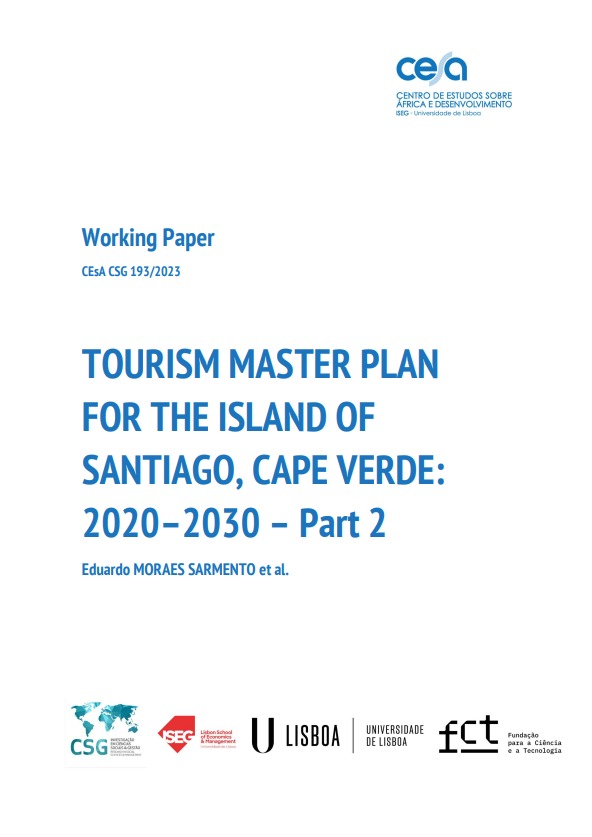
Working Paper 193/2023: Tourism Master Plan for the Island of Santiago, Cape Verde: 2020-2030 – Part 2
Abstract:
Cape Verde, a small insular development economy (SIDS), has been confronted and faces various economic, social and environmental constraints throughout its history that have been conditioning its growth strategy. In recent years, tourism has been growing and consolidating an important contribution to economic development, which is observable in the evolution of the number of nights spent in the country, revenue, number of guests, employment generation, and incentive to exports, among others. The gross added value of tourism currently has a weight that is already more than 20% of its GDP (excluding the COVID-19 pandemic period). Aware of this potential, the government created conditions for a greater use of its effects as a mobilizing factor in the economy, as reflected in various official supporting documents and strategic orientations, such as the Strategic Plan for Sustainable Development, and the Main Options of the Strategic Plan for Sustainable Development for the Tourism Activity. The Government decided that each island or region should develop its own strategic tourism plan (Masterplan). Tourism Master Plan For The Island Of Santiago, Cape Verde : 2020–2030 – Part 2 proposes several main strategic reflections about the Tourism Master Plan for the Island of Santiago in order to improve its competitiveness.
Quotation:
Sarmento, E. M. et al. (2023). “Tourism Master Plan For The Island Of Santiago, Cape Verde : 2020–2030 – Part 2”. Instituto Superior de Economia e Gestão – CEsA/CSG – Documentos de Trabalho nº 193/2023
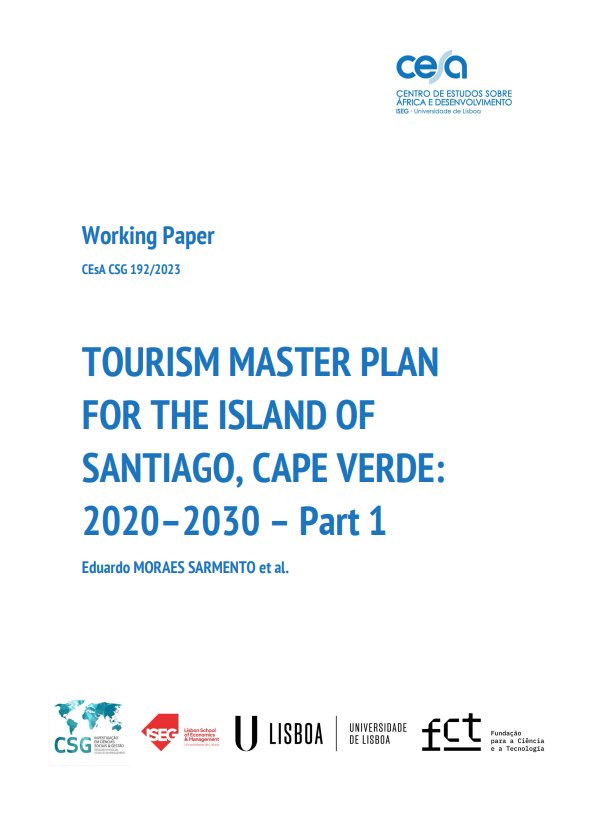
Working Paper 192/2023: Tourism Master Plan for the Island of Santiago, Cape Verde: 2020-2030 – Part 1
Abstract:
Cape Verde, a small insular development economy (SIDS), has been confronted and faces various economic, social and environmental constraints throughout its history that have been conditioning its growth strategy. In recent years, tourism has been growing and consolidating an important contribution to economic development, which is observable in the evolution of the number of nights spent in the country, revenue, number of guests, employment generation, and incentive to export among others. The gross added value of tourism currently has a weight that is already more than 20% of its GDP (excluding the COVID-19 pandemic period). Aware of this potential, the Government created conditions for a greater use of its effects as a mobilizing factor in the economy. Accordingly, various official supporting documents and strategic orientations have been approved, such as the Strategic Plan for Sustainable Development and the Main Options of the Strategic Plan for Sustainable Development for the Tourism Activity. It was also decided that each island or region should develop its own strategic tourism plan (Masterplan). Tourism Master Plan For The Island Of Santiago, Cape Verde: 2020–2030 – Part 1 integrates the main strategic reflections regarding the Tourism Master Plan for the Island of Santiago. Revenue from tourism on the Island of Santiago, where the capital of Cape Verde is located, has been much less than the values of the main islands with a high volume of tourists – Sal and Boa Vista. However, the potential of Santiago is high, and therefore it is necessary to adopt the correct measures required to transform this potential into reality. Therefore, this paper presents a short, medium and long-term vision, with a proposal for strategic objectives that will constitute the anchor on which all operational strategic and objectives that will translate into specific lines of action will be based. In summary, this document proposes a strategy based on a diversified and differentiated touristic offer from the other islands of the country, which maximises its potential, counteracting regional asymmetries and preserving the historical and intangible heritage, as well as the natural resources, with the aim for the whole population to benefit from the resultant economic development, especially the most disadvantaged.
Quotation:
Sarmento, E. M. et al. (2023). “Tourism Master Plan For The Island Of Santiago, Cape Verde: 2020–2030 – Part 1”. Instituto Superior de Economia e Gestão – CEsA/CSG – Documentos de Trabalho nº 192/2023





